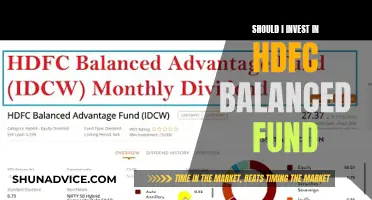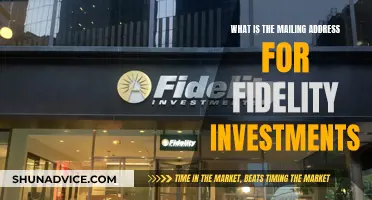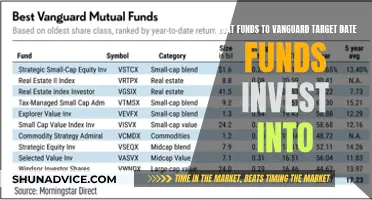
The Sequoia Fund is a mutual fund that has been advised by Ruane Cunniff LP since its inception in 1970. It has a long-term, value-oriented approach and focuses on the quality of a business and its management rather than short-term economic prospects. The fund has had its ups and downs over the years, including a period of poor performance in 2015 when nearly one-third of its assets were in troubled Valeant Pharmaceuticals. However, it has also had periods of strong performance, such as outperforming its large-cap peers in 332 out of 333 rolling 10-year periods dating back to its inception. With any investment, past performance does not guarantee future results, and it is essential to consider the fund's current state and prospects rather than relying solely on its past glory.
What You'll Learn

Sequoia Fund's long-term, value-oriented approach
Sequoia Fund is a mutual fund that has been advised by Ruane Cunniff LP since its inception on July 15, 1970. The firm has managed the fund with a long-term, value-oriented approach through multiple market cycles, portfolio managers, and generations of leadership.
The touchstone of their approach is the idea that a share of stock entitles its owner to an interest in the profits of a business enterprise. This means that they think like owners of businesses rather than holders of stocks. They research businesses with the idea of owning them for many years, and often decades.
Sequoia Fund focuses on the quality of a business and the competence of its management rather than the near-term prospects of the economy and the future direction of the stock market. They aim to find businesses with an edge, an advantage that is sustainable across long periods, different generations of leadership, and the ups and downs of the economy and the stock market.
This long-term mindset and value-oriented approach have guided Sequoia Fund's investment decisions and helped them achieve success over the years.
Taxable Bonds: Mutual Fund Investment Strategy
You may want to see also

The fund's performance and past results
The Sequoia Fund is a mutual fund that has been advised by Ruane Cunniff LP since its inception on July 15, 1970. The fund has managed investments through multiple market cycles, portfolio managers, and generations of leadership, maintaining a long-term, value-oriented approach.
From 1970 to 2024, the fund has built an enviable track record. As of June 30, 2024, a $10,000 investment at the fund's inception in 1970 would have grown significantly. However, it is important to note that past performance does not guarantee future results, and investment returns may fluctuate.
The fund's performance has been compared to the Standard & Poor's 500 Index (S&P 500). For the second quarter of 2018, the fund generated a total return of 5.80%, net of fees, while the S&P 500 returned 3.43%. Year-to-date through June 30, 2018, the fund generated a 7.16% total return, outperforming the S&P 500's 2.65% return.
The fund's long-term success can be attributed to its focus on investing in companies with sustainable advantages across different generations of leadership and economic cycles. This approach aims to achieve results that are different and better than what everyone else is doing.
However, the fund has also experienced setbacks. In 2015, nearly one-third of the fund's assets were invested in Valeant Pharmaceuticals (now Bausch Health Companies), which experienced a significant drop in value due to controversial business practices and fraud accusations. This resulted in a loss of over 90% of the fund's value in just a few months, highlighting the risks of concentrating on a small number of stocks.
Despite this setback, the fund has demonstrated resilience and a commitment to long-term investing. The fund's managers treat clients as true partners, communicating plainly about their successes and failures.
In summary, the Sequoia Fund has a strong track record of performance, outperforming its peers and the S&P 500 over various periods. However, past results do not guarantee future returns, and the fund has experienced significant losses due to concentrated investments. Prospective investors should carefully consider the fund's strategy, risks, and recent performance before making investment decisions.
A Guide to Money Market Funds: Investing Basics
You may want to see also

The fund's management team
The Funds Management Team
The Sequoia Fund is a mutual fund that has been advised by Ruane Cunniff LP since its inception on July 15, 1970. The firm has managed the fund through multiple market cycles, portfolio managers, and generations of leadership, always maintaining a long-term, value-oriented approach.
Ruane Cunniff LP is an investment adviser best known for managing the Sequoia Fund. They have a sustainable advantage due to their great value investing mindset. They focus on finding people and organisations with a sustainable edge over their competition. The firm understands that to get different and better results, they must do things differently from everyone else.
John Harris, a member of the investment committee at Ruane Cunniff LP, emphasised that their mindset, way of thinking, and culture set them apart from other firms. He stated that while they do extensive research, they do not focus on short-term results or put pressure on their team to generate ideas within a specific timeframe. Instead, they value the process over the outcome and believe that executing the process well over time will lead to successful results.
The management team at Sequoia Fund thinks like owners of businesses rather than holders of stocks. They research businesses with the intention of owning them for many years or even decades. They focus on understanding the quality of a business and its management rather than trying to predict the near-term prospects of the economy or the stock market.
Will Smith's Investment Fund: A Star's Money Move
You may want to see also

The fund's investment strategy
The Sequoia Fund is a mutual fund that has been advised by Ruane Cunniff LP since its inception on July 15, 1970. The firm has managed the fund with a long-term, value-oriented approach, thinking like business owners rather than stockholders. This means that they focus on the quality of a business and the competence of its management rather than the near-term prospects of the economy or the stock market.
The fund has a long-term mindset, researching businesses with the intention of owning them for many years or even decades. They also have a concentrated portfolio strategy, investing in a small number of high-potential stocks. This approach can be rewarding but also carries more risk, as the performance of the portfolio is heavily dependent on a limited number of stocks.
The fund's strategy involves making extensive research-based investments in companies that are available at significant discounts to their intrinsic value and are protected by a strong competitive advantage. This is known as a value investing mindset, focusing on finding an edge or advantage that is sustainable over long periods.
The fund's management also emphasizes the importance of a humble mindset and a focus on the process rather than the outcome. They believe that if they execute the process well over a long period, the outcomes will take care of themselves. This approach aims to prioritize the client's interests and generate the best investment performance rather than maximizing short-term profits.
Broad-Based Index Funds: A Comprehensive Investment Guide
You may want to see also

The risks and potential outcomes of investing in the fund
The Risks and Potential Outcomes of Investing in the Sequoia Fund
The Sequoia Fund is a mutual fund that has been advised by Ruane Cunniff LP since its inception in 1970. The fund has a long-term, value-oriented approach, focusing on investing in businesses for years, or even decades. This approach has led to impressive historical returns, with a $1,000 investment at the fund's inception being worth more than $200,000 by 2008.
However, investing in the Sequoia Fund, as with any investment, carries risks. One of the main risks is the fund's strategy of concentrating on a small number of stocks. While this strategy can lead to higher returns if the stocks perform well, it can also result in significant losses if one or more of the stocks decline in value. For example, the fund suffered a major loss when it heavily invested in Valeant Pharmaceuticals, which ended up losing more than 90% of its value in a few months. This mistake cost the fund nearly half of its assets and led to a loss of patient investors.
Another risk to consider is the fund's management. While the fund has a strong track record, it is important to recognize that the current management team is mostly composed of relative newcomers. The fund's performance may not live up to its past glories, and recent results have been underwhelming compared to its peers. Additionally, the fund's strategy of running a concentrated portfolio of a few stocks can be risky if the management team makes poor investment decisions.
On the other hand, the fund has demonstrated a strong value investing mindset, focusing on finding sustainable advantages and long-term gains rather than short-term profits. This mindset has helped the fund generate impressive returns in the past, and it continues to be a key differentiator for the fund. The fund's research-oriented approach and long-term focus set it apart from other firms, and this unique mindset could potentially lead to future successes.
In conclusion, investing in the Sequoia Fund carries both risks and potential outcomes. The fund's concentration strategy and management changes pose risks, but its strong value investing mindset and long-term focus offer potential for future gains. As with any investment, past performance does not guarantee future results, and investors should carefully consider their risk tolerance and investment goals before deciding to invest in the Sequoia Fund.
Mutual Funds in Your 20s: A Guide to Getting Started
You may want to see also
Frequently asked questions
The Sequoia Fund is a mutual fund that has been advised by Ruane Cunniff LP since its inception on July 15, 1970. It is known for its long-term, value-oriented approach to investing, focusing on the quality of businesses and the competence of their management rather than short-term economic prospects.
As with any investment, past performance does not guarantee future results. The fund's returns may be higher or lower than previously quoted performance data. Additionally, the fund has a history of concentrating on a small number of stocks, which can be riskier than a diversified portfolio.
The Sequoia Fund has a strong track record, outperforming its large-cap peers in 332 of 333 rolling 10-year periods dating back to its inception. It is known for sound communications with shareholders, responsible governance, and a commitment to sensible, low-cost, low-turnover investing.
To open an account, you will need to provide your name, address, date of birth, and other identifying information as required by Federal law to prevent money laundering and the funding of terrorism. You can open an account online or by submitting the appropriate application forms.







